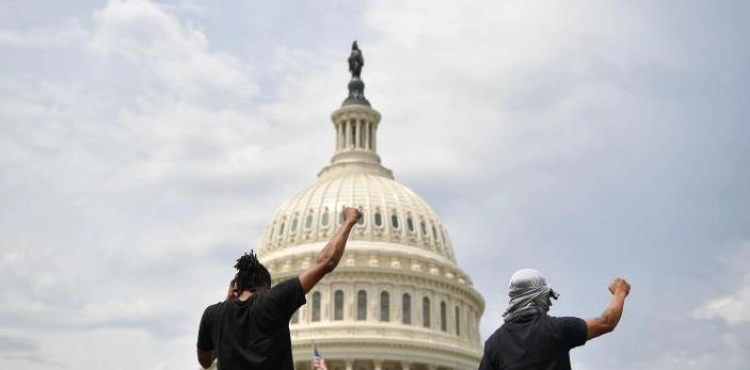US Defense Secretary Mark Esper expressed on Wednesday his opposition to resorting to a law allowing the deployment of the army in American cities, in order to counter the widespread protest movement against racism and violence by the police, in a clear contrast. With the position of US President Donald Trump.
The US Defense Secretary´s statements come at a time when the country is preparing for an additional day of protests, and after a week full of peaceful demonstrations but also night disturbances, as protesters continue to violate the curfew imposed in several American cities.
But Tuesday night-Wednesday night was quieter, during which unrest was limited to local looting in the wake of major peace rallies organized during the day.
On Monday, when things were heading towards an escalation of riots in several cities, the US President threatened to deploy the army to "end the problem quickly", in a situation which the opposition hastened to condemn, considering it tyrannical.
"I do not support resorting to the Intifada Law," which allows the president to deploy the army in the face of American citizens, instead of the National Guard forces currently deployed in several cities, Esber said.
In Washington, it was decided to reduce the hours of the curfew that will come into effect on Wednesday 23:00 instead of 19:00, and the authorities expected that the peaceful atmosphere will continue. And large numbers of police officers were deployed to prevent access to the White House.
On Tuesday night, thousands demonstrated peacefully in Washington to condemn the death of George Floyd, the black American who had suffocated during his arrest in Minneapolis by a white policeman on May 25, and with racism and violence by police in the United States.
The demonstrators chanted "There is no peace without justice" and "Our hands are raised, do not shoot."
Many continued to demonstrate, breaking the curfew, but the atmosphere remained quieter than the previous two days, especially on Monday evening when security forces used tear gas to disperse the demonstrators near the White House, so that Trump could go on foot to an ancient church close to the White House that was subjected to sabotage in The day before and a picture was taken in front of it, carrying a Bible.
It appears that Trump wanted to take courageous action after media outlets reported that the White House security service hastily transferred him to a bunker during a demonstration in front of the White House.
"It is wrong information," Trump told Fox News, adding that "it was during the day," explaining that he had gone to the site "two or three times" during the past days, but each time in order to "check the place."
Also in New York, where the curfew was extended until Sunday, the weather was quieter on Tuesday evening, after the scenes of violence recorded over the weekend.
In the Brooklyn neighborhood, hundreds of breaches of the curfew have been violated, and Aaron, a 20-year-old student, told Agence France-Presse that he opposed the decision, saying: "In their opinion, people should not pretend against the killing of a person, someone pressed his knee to his neck to death," referring to the death of George Floyd during his arrest. At the hands of policeman Derek Schofen.
In all, the police have made more than 9,000 arrests in the country in recent days, according to estimates published by US media, against the background of violence and a breach of the curfew.
And in Minneapolis, the epicenter of the anger movement where Floyd was killed, there was calm.
A. Jay Channer, singer of the "Fire from Gods" group, told Agence France Presse that he is demonstrating not against the police but against the system that allows the practices of this police.
Floyd spent a suffocation on May 25, chanting "I cannot breathe" and calling his mother, handcuffed, while a policeman kneeling on his neck to hold him in his knee, and his three other colleagues watch the scene without interfering.
Police officer Chauvin was expelled from his work and arrested and charged with manslaughter, as were the other three policemen, but no judicial measure was taken against them.












